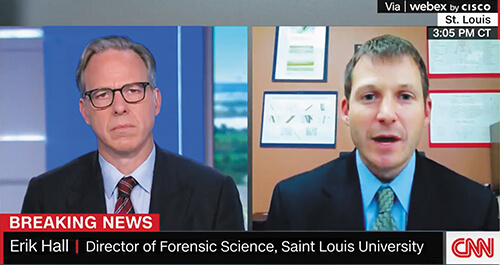National forensics expert seeks justice in cases

If you work in the field of forensics, you might find yourself working in a lab one minute and then appearing on CNN to discuss a headline-grabbing homicide case the next.
That’s all in day’s work for biochemistry graduate Erik Hall ’06, the director of the forensic science program and assistant professor at Saint Louis University (SLU) in St. Louis, Missouri.
“My typical day consists of working with students in the forensic science program, whether on cutting-edge DNA research, laboratory assignments, mentoring or teaching,” he said. “In addition, I am always working with outside agencies, such as crime laboratories and medical examiner offices, to develop relationships between academics and government agencies.”
As the Gabby Petito homicide case unfolded across the nation, Hall appeared on CNN in October to discuss the autopsy. Although he doesn’t have direct information related to the case, the network asked him to speak as an expert to what might be going on in the case in general.
“Forensic experts, like I am, would be independently analyzing any evidence collected at the crime scenes for DNA, fingerprints, trace evidence and so on,” he explained. “The forensic scientists would be using all available tools and techniques in this case, just like they would in any other investigation, to try and obtain the best possible evidence from the body, clothing, van or crime scene to provide to law enforcement and attorneys who are investigating the case.”
Prior to his job at SLU, he worked in the St. Louis Police Department Crime Laboratory as the biology technical leader. In this role, he processed homicides, police shootings and sexual assaults, looking for any DNA evidence that may have been left behind. Through this role, he presented at forensic science conferences and as a guest lecturer for professors at the university, which led to his current teaching role.
“Of course, my first teaching role was a lab assistant for Dr. [Roseann] Sach’s organic chemistry lab more than 16 years ago,” he said. “I can’t help but think that all these years later I have lab assistants of my own.”
He credits Sachs with serving as a mentor during his formative time at Messiah.
“We have kept in touch throughout the years and just knowing that a professor like her cares that much to follow up on your career and life means a lot and affirms the choice I made in choosing Messiah for an education,” said Hall.
After 13 years in forensic science, what’s next for him? He created Hall Forensic Consulting to provide expert services and training opportunities to law enforcement and lawyers in St. Louis and throughout the U.S.
“I have always been passionate about ensuring victims—and suspects—get justice in their respective cases,” he said. “I envision myself working more closely with the law community to ensure lawyers have the necessary knowledge to properly prosecute or defend a case involving forensic science.”
From biochem major to national forensics expert, Hall says attending Messiah fostered his passion for science and ultimately led him to where he is today.
—Anna Seip and Molly McKim ’23